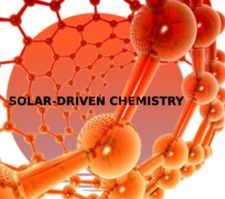Activities
Research
 Solar-Driven Chemistry.
Solar-Driven Chemistry.It is a radical paradigm shift in chemical production: how to use renewable energy sources to drive chemical reactions rather than use fossil fuels to provide the thermal energy necessary for the reactions. We are working in various areas to move in this direction, from the electrocatalytic conversion of CO2 and H2O, to the photo(electro)catalytic water electrolysis, to the development of novel electrocatalytic routes (and related electrodes) for biomass conversion, to the development of advanced solutions for chemical energy storage and to enable world trading of renewable energy, and to the development of novel photoelectrocatalytic (PEC) solar cells (artificial-leaf type) for the conversion of CO2, and of the related nanostructured anodes and cathodes.
 Circular Economy.
Circular Economy. A circular economy is an industrial system in which the use of resources and energy is minimize by proving new routes for use of the actual waste and developing new processes and technologies which reduce the use of resources and energy. We are working on different solutions in this direction, from the development of new processes for converting municipal solid waste to chemicals and fuels, to the reuse of CO2 through the use of renewable energy, to new solutions to decrease the fossil fuel consumption, and to the development of novel intensified processes which reduce the steps to enable higher resource/energy efficiency.
 Catalytic membranes. Based on Pd-alloy supported thin films for applications from environment protection (reduction of nitrate in water) to chemical synthesis (H2O2 direct synthesis) and energy. Recent focus is on the new energy-efficient membrane-based processes for the production of H2 by CH4 steam reforming and syngas by catalytic partial oxidation.
Catalytic membranes. Based on Pd-alloy supported thin films for applications from environment protection (reduction of nitrate in water) to chemical synthesis (H2O2 direct synthesis) and energy. Recent focus is on the new energy-efficient membrane-based processes for the production of H2 by CH4 steam reforming and syngas by catalytic partial oxidation.
 Chemo-catalytic processes for ligno-cellulosic biorefineries. Development of novel catalysts for the conversion of ligno-cellulosic biomass (in particular waste materials) to novel platform molecules (furfurals) and the catalytic upgrading of the latter to biofuels (gasoline and diesel) or chemicals. Recent development area is the use of electrocatalytic methods in biomass conversion.
Chemo-catalytic processes for ligno-cellulosic biorefineries. Development of novel catalysts for the conversion of ligno-cellulosic biomass (in particular waste materials) to novel platform molecules (furfurals) and the catalytic upgrading of the latter to biofuels (gasoline and diesel) or chemicals. Recent development area is the use of electrocatalytic methods in biomass conversion.

The research is focused on the development of innovative materials for sustainable chemical and energy processes.
The main fields of interest are the following:
- use of the solar energy and of renewable resources such as biomass
- sustanable production of new energy vectors
- reduction of the emissions of greenhouse gases and of the impact on the environment of the chemical and energy production
- development of new eco- and energy-efficient processes
Type of catalytic and functional materials investigated:
- (mixed) metal-oxides, nanostructured oxide thin films, supported metal nanoparticles, micro- and meso-porous materials, metal and metal-oxide thin-film membranes, nanocarbon based materials
Fields of research:
- catalyst testing and kinetics, synthesis and characterization of the catalysts, relation between nanostructure and functionality
